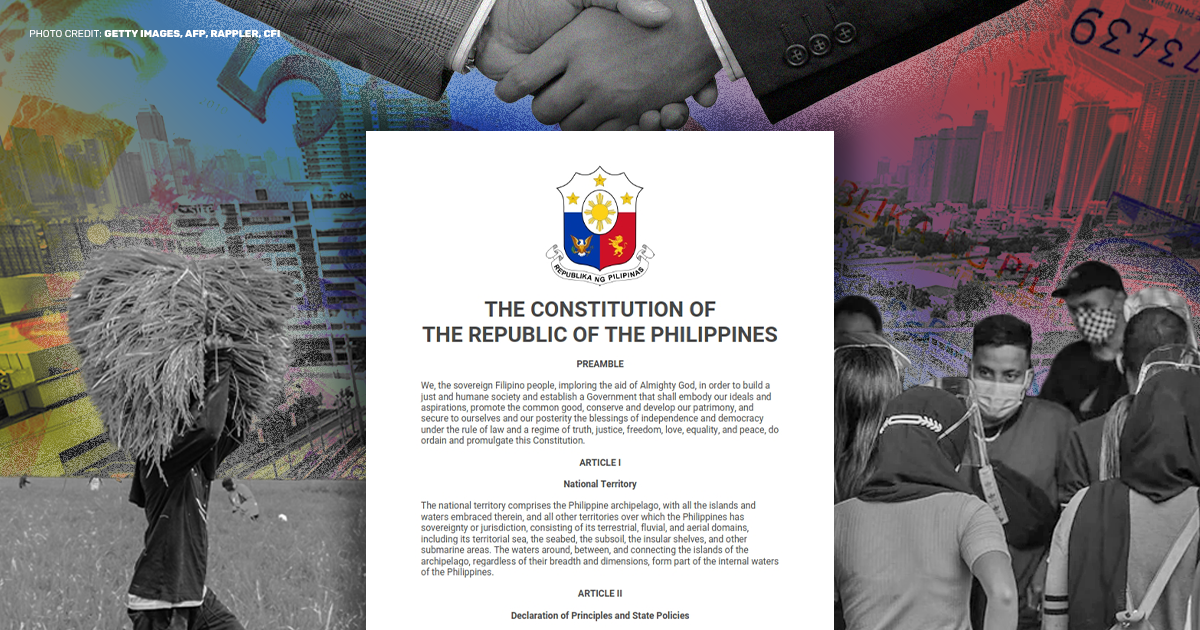To the disservice of millions of Filipinos, earlier this March, the House of Representatives voted 301-6-1 in favor of calling for a constitutional convention to amend certain political and economic provisions in the 1987 Constitution.
While there are nuances in each amendment, there’s a recurring theme among all charter changes (Cha-cha). In the political aspect, the focus is on prolonging terms in office especially of the presidency. For the economy, it’s opening the country to more foreign investment. Its cultural implications are not as discussed but also worth tackling.
Political
As of writing, there are at least three Resolutions on Both Houses (RBH) drafted by lawmakers that discuss these changes. RBH 1, drafted by Dong Gonzales, seeks to shorten the terms of president and vice president from six years to five, but they will be allowed to run for two terms. “Why extend the presidency?”, one might ask. RBH 1 claims that the six-year term “appears to be insufficient” for the implementation of long-term programs.
But the Marcos dictatorship is proof alone that the length of political rule does not mean that the country is better off. Ferdinand Marcos Sr ruled for over 20 years, and the economy took a severe turn for the worse in those years. It was during this long dictatorship that the economy contracted for two consecutive years in 1984 and 1985. For context, economic growth since Philippine independence in 1946 had always been positive until then (that is, the economy had always been expanding). The only other times that the economy contracted were in 1991 during the early 1990s global recession, in 1998 after the 1997 Asian Financial Crisis, and in 2020 upon the global COVID-19 lockdowns.
The economic plunge during the Marcos dictatorship was so deep that it took another 21 years for the country’s gross domestic product (GDP) per capita to return to its level in 1982. (See Chart)

Furthermore, RBH 1 argues that the president and vice president should be voted for as a tandem “to encourage strong party system” and because “a long-term solution is wanting.”
The enforcement of a “tandem vote” goes against the general trend of most elected post-EDSA administrations where the president and vice president come from different political parties, showing that electoral preferences are not along party lines. Corazon Aquino and Salvador Laurel came from the same party but were in power as a revolutionary government. Gloria Macapagal-Arroyo and Teofisto Guingona Jr both came from Lakas but were not elected together, with Arroyo becoming president only following Joseph Estrada’s ouster and not via election.
Even the current president and vice president come from different political parties. Although they ran as a tandem in 2022, Ferdinand Marcos Jr ran under the Partido Federal ng Pilipinas (PFP), while Sara Duterte ran under Lakas.
Strengthening the party system is not as simple as implementing a team vote on the presidential and vice-presidential elections. The truth is, for as long as the main motivation of politicians in winning elections is self-interest over platform and issue-based politics, the party system will remain weak even if presidents and vice presidents are voted together.
Economic
The proposed amendments also talk about liberalization or the opening up of the economy to foreign capital. Much of the arguments on economic Cha-cha revolve around foreign direct investment (FDI), about which IBON has tirelessly argued that more FDI does not mean national development. Despite FDI in the country since the 2000s growing to record highs: agriculture’s share in GDP has declined by over six percentage points to 8.9% in 2022 or its smallest in the country’s history; manufacturing’s share in turn declined by nearly four percentage points to 18.7% or as small as in the early 1950s; annual net employment creation has been generally falling and the 664,000 contraction in 2017 is the worst drop in job creation since the Asian financial crisis; and the trade deficit hit a record US$43.5 billion in 2018.
Cha-cha proponents wish to liberalize many key sectors in the economy. RBH 2 and RBH 4, authored by Lord Allan Velasco and Gus Tambunting respectively, wish to further open up the mining industry by inserting the phrase “UNLESS OTHERWISE PROVIDED BY LAW” in paragraph 1, Section 2 of Article XII of the 1987 Constitution – giving lawmakers a chance to pass a mining liberalization policy that is more favorable to foreigners and looser than the current Philippine Mining Act.
Under the Philippine Mining Act of 1995, foreign corporations are already allowed to have 100% ownership in mining operations, provided that it is under a Financial or Technical Assistance Agreement (FTAA) – a type of mining right given by the government to contractors specifically for large-scale exploration, development, and utilization of mineral resources.
Should charter change allow Congress to liberalize mining even more, it is very likely that lawmakers will revise the Philippine Mining Act into something even more favorable for foreign capital. Even small-scale mining permitted through mineral agreements which is currently reserved for Filipino citizens and firms with at least 60% capital from such citizens may be further opened up to foreign capital.
Water liberalization will also be giving more opportunities for foreign capital to control water resources, on top of water privatization through concession agreements between the government and private water service providers. But foreign capital’s track record with water resources management is turbid. For instance, investors such as Marubeni, Scythe, and KPIC Netherlands B.V. (KPN), which owns all shares to the San Roque Power Corporation (SRPC), supposedly for flood control, have been criticized for inundating Pangasinan for several days after releasing 5.4 million liters of water during Typhoon Pepeng. Damages to crops, fish, roads, dikes and infrastructure were estimated to be worth Php4 billion.
Relaxing the Constitution’s 60-40 national equity requirement will be unprecedented in terms of turning water into a commodity to profit from. In other countries such as Canada, where the First Nations indigenous community is from, provinces are given the right to sell their water to whomever, including transnational corporations (TNC) such as Nestle. While Nestle pays Ontario province US$390.40 per million cubic meters of water, the national minorities of Six Nations get nothing, despite the company extracting 3.6 million liters of water each day from Six Nations.
In terms of land, it was also reported that the Senate committee on constitutional amendments and revision of codes under Sen. Robinhood Padilla recommended that land be opened to 100% foreign ownership and allowing foreign citizens to acquire land up to 1,000 square meters, and allowing foreign firms to own rural land up to five hectares.
The liberalization of land is more than a threat to sovereignty. Land is intrinsically a limited resource that is already inaccessible for millions of Filipinos. Should land acquisition be open to foreigners, they will be forced to compete for space, aggravated by the fact that people from developed countries have more purchasing power than locals. Allowing foreign ownership will put pressure on land prices, distort land and property markets, and worsen inequalities in ownership against Filipinos. There is something fundamentally wrong with a legal framework that allows foreigners to acquire large parcels of land while millions of Filipinos remain landless.
Most countries in Southeast Asia don’t allow foreign land ownership including Vietnam, Thailand and Indonesia which, for the sake of argument, still already get more FDI than the Philippines. Only Singapore and Malaysia allow this.
Cultural
Aside from natural resources, lawmakers are also proposing to liberalize advertising and mass media, which may have serious effects in the context of the country’s information ecosystem.
The trouble lies especially with mass media. The constitution says that ownership of mass media is reserved only for Filipinos. The reason it was designed this way is because media can be used to win the hearts and minds of Filipinos to consent to policies that ultimately go against their interests and promote foreign interests.
This is not without precedent. In history, mass media was used to justify the occupation of Japanese military forces in the country during World War II. In other countries, mass media was used for the same purposes in the US context of the Bush administration’s war on terror in Iraq. It also had a role, to some degree, in circulating falsehoods about the 2020 US election, which fueled an insurrection in the US Capitol.
With how the rich and powerful handle information, opening up mass media ownership to foreign firms puts the country at greater risk of being exposed to propaganda that caters to foreign interests.
We have other problems
The constitutional convention for Cha-cha is said to cost Php9.5 billion. Its delegates, to receive Php10,000 for a day of meetings. With so much that the government should prioritize spending on, Cha-cha is the last thing the country needs.
While Congress and its cohorts in the private sector are preoccupied with pushing for charter change, the Philippine economy, and the people who drive it with their labor and toil, are neglected. The opportunity cost of this self-serving charter change is money better spent on social services and economic aid, especially now that the country has reopened and has so much to recover after the damaging pandemic lockdowns.
This effort’s proponents argue that this amount is a “little sacrifice” for the country’s improvement. The government appears so eager to give little sacrifices, yet Php18.3 billion worth of aid targeted cash transfers, funds that were meant to help the poor, were left undistributed. This is also the same government that gave a Php7.5 billion cut for regular emergency cash assistance, a Php5.1 billion cut for the Pantawid Pamilyang Pilipino Program (4Ps), and a Php893.6 million cut for the Philippine General Hospital (PGH).
There are also far more pressing issues that have to be discussed, addressed, and be part of the state’s agenda – issues like the consistently fast inflation rate and high prices in the market, with inflation reaching a 14-year high in November last year; the urgent need for higher wages; and the country’s pandemic recovery, which requires a comprehensive and sustainable plan for the economy that goes beyond mere vaccination efforts.
But while lawmakers are too busy taking one step forward in charter change, they take two steps back in public welfare.



